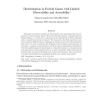Free Online Productivity Tools
i2Speak
i2Symbol
i2OCR
iTex2Img
iWeb2Print
iWeb2Shot
i2Type
iPdf2Split
iPdf2Merge
i2Bopomofo
i2Arabic
i2Style
i2Image
i2PDF
iLatex2Rtf
Sci2ools
MSS
2011
IEEE
2011
IEEE
Discrimination in festival games with limited observability and accessibility
This paper provides an analysis of discrimination and prejudices from the perspective of inductive game theory. We extend the festival game, originally given by Kaneko-Matsui, to include new constraints on the observability of ethnic identities and on accessible locations for players. We characterize the Nash equilibrium set, which reveals a different variety of segregation patterns and discriminatory behavior than before. In order to facilitate the analysis of discrimination and prejudices, we introduce a measure of discrimination, which chooses a representative equilibrium with the smallest degree of discrimination. Using this measure, we discuss various new phenomena, such as discrimination in an ethnic hierarchy; similar ethnicities as
| Added | 21 Aug 2011 |
| Updated | 21 Aug 2011 |
| Type | Journal |
| Year | 2011 |
| Where | MSS |
| Authors | Mamoru Kaneko, Aniruddha Mitra |
Comments (0)

